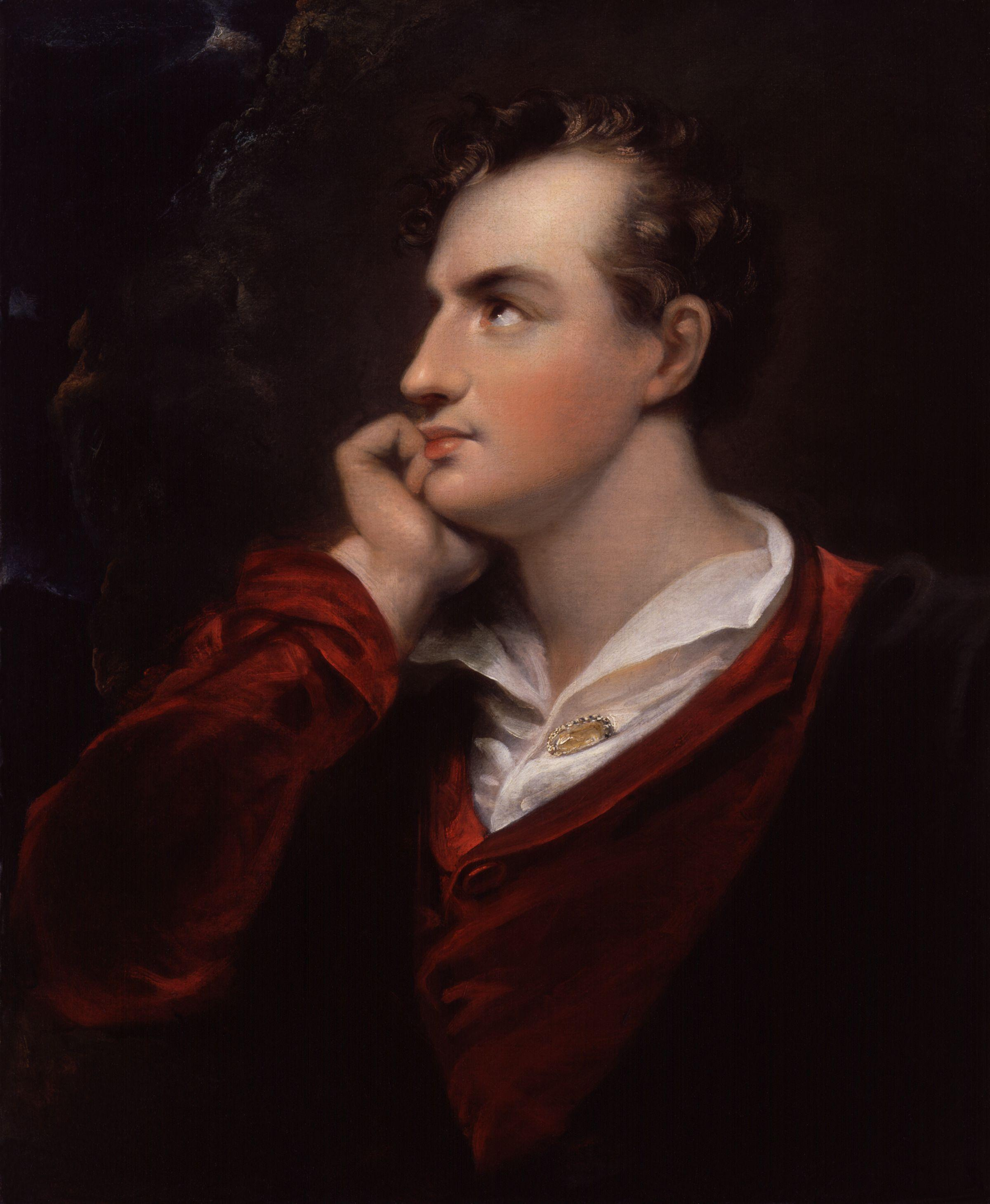
George Gordon Byron frasi celebri
Frasi sull'amore di George Gordon Byron
Origine: Da So we'll go no more a-roving, in Poesie, 1817
Origine: Citato in Tomba di Giulietta http://www.verona.com/index.cfm?Page=Guida§ion=luoghi&id=177, Notiziario BPV, numero 2, anno 1995.
Frasi sulla vita di George Gordon Byron
Don Giovanni
Origine: Citato in Elena Spagnol, Citazioni, Garzanti, 2003.
Origine: Da Il sogno, capitolo I
George Gordon Byron Frasi e Citazioni
“Il ricordo del piacere non è più piacere. Il ricordo del dolore è ancora dolore.”
Origine: Da Marin Faliero doge di Venezia
“Chi ha da fare non ha tempo per le lacrime.”
Origine: Da I due Foscari, Atto IV, Scena 1
“Oh Roma! mia patria! città dell'anima!”
IV canto
Il pellegrinaggio del giovane Aroldo
“Il "buon tempo andato"… il tempo è sempre buono quand'è andato.”
Origine: Da L'età del bronzo
“Non v'è nulla, senza dubbio, che calmi lo spirito come il rum e la vera religione.”
Origine: Citato in Focus, n. 94, p. 168.
canto IV, st. 1
Il pellegrinaggio del giovane Aroldo
“Più riposo non arreca il sonno che il piacere più non sazia.”
libro Il corsaro
Un vaso d'alabastro illuminato dall'interno
Origine: Citato in Anthony Clifford Grayling, Il significato delle cose
“Nello sport puoi scegliere tra il piacere della vittoria e il piacere della sconfitta.”
Origine: Citato in Marco Pastonesi e Giorgio Terruzzi, Palla lunga e pedalare, Dalai Editore, 1992, p. 100, ISBN 88-8598-826-2.
Origine: Citato in Kay Redfield Jamison, Toccato dal fuoco, traduzione di A. Serra, TEA, 2009, cap. 1, p. 18.
Origine: Citato in André Maurois, La prima "Lady" stregata da Byron
“Il diavolo non ha al suo arco frecce che vadano dritto al cuore più di una bella voce.”
Origine: Citato in Leggendo qua e là..., La settimana enigmistica, N. 4370, p. 4.
Un vaso d'alabastro illuminato dall'interno
Origine: Da A Thomas Moore, luglio 1817, in Pezzi domestici e altre poesie, traduzione di Cesare Dapino, Einaudi, Torino, 1986, p. 189. ISBN 88-06-59386-2
George Gordon Byron: Frasi in inglese
As quoted in Conversations of Lord Byron with Thomas Medwin (1832), Preface.
“Old man! ’tis not so difficult to die.”
Act III, scene iv
Manfred (1817)
Origine: English Bards and Scotch Reviewers (1809), Line 826. A number of authors have addressed this common motif of an eagle shot with an eagle-feather arrow
“Perverts the Prophets and purloins the Psalms.”
Origine: English Bards and Scotch Reviewers (1809), Line 326.
“When all of genius which can perish dies.”
Origine: Monody on the Death of Sheridan (1816), Line 22.
“The love where Death has set his seal,
Nor age can chill, nor rival steal,
Nor falsehood disavow.”
And Thou Art Dead as Young and Fair http://readytogoebooks.com/LB-thou38.html (1812).
“A man must serve his time to every trade
Save censure — critics are ready-made.”
Origine: English Bards and Scotch Reviewers (1809), Line 63.
“She was his life,
The ocean to the river of his thoughts,
Which terminated all.”
Stanza 2; this can be compared to: "She floats upon the river of his thoughts", Henry W. Longfellow, The Spanish Student, act ii, scene 3.
The Dream (1816)
Origine: English Bards and Scotch Reviewers (1809), Line 75.
“Jack was embarrassed — never hero more,
And as he knew not what to say, he swore.”
The Island (1823), Canto III, Stanza 5.
“But we, who name ourselves its sovereigns, we,
Half dust, half deity, alike unfit
To sink or soar.”
Act I, scene ii.
Manfred (1817)
“The cold in clime are cold in blood,
Their love can scarce deserve the name.”
Origine: The Giaour (1813), Line 1099.
The Island (1823), Canto II, Stanza 19.
“I loved my country, and I hated him.”
The Vision of Judgment, lxxxiii, reported in Bartlett's Familiar Quotations, 10th ed. (1919).
“Sighing that Nature formed but one such man,
And broke the die, in molding Sheridan.”
Origine: Monody on the Death of Sheridan (1816), Line 117; this can be compared to: "Natura il fece, e poi ruppe la stampa" (translated: "Nature made him, and then broke the mould"), Ariosto, Orlando Furioso, canto x, stanza 84; "The idea that Nature lost the perfect mould has been a favorite one with all song-writers and poets, and is found in the literature of all European nations", Book of English Songs, p. 28.
Canto I, stanza 15.
The Corsair (1814)
Stanza 34; this can be compared to: "My heart is wax to be moulded as she pleases, but enduring as marble to retain", Miguel de Cervantes, The Little Gypsy.
Beppo (1818)
“I only know we loved in vain;
I only feel — farewell! farewell!”
Farewell! If Ever Fondest Prayer (1808), st. 2.
“Yet in my lineaments they trace
Some features of my father's face.”
Parisina, Stanza 13, reported in Bartlett's Familiar Quotations, 10th ed. (1919).
“Born in the garret, in the kitchen bred.”
A Sketch, reported in Bartlett's Familiar Quotations, 10th ed. (1919).
“When we two parted
In silence and tears,
Half brokenhearted,
To sever for years.”
When We Two Parted (1808), stanza 1.
“She walks the waters like a thing of life,
And seems to dare the elements to strife.”
Canto I, stanza 3.
The Corsair (1814)
“Maid of Athens, ere we part,
Give, oh give me back my heart!”
Maid of Athens http://readytogoebooks.com/MOA43.htm, st. 1 (1810).
On This Day I Complete My Thirty-Sixth Year, st. 10.
